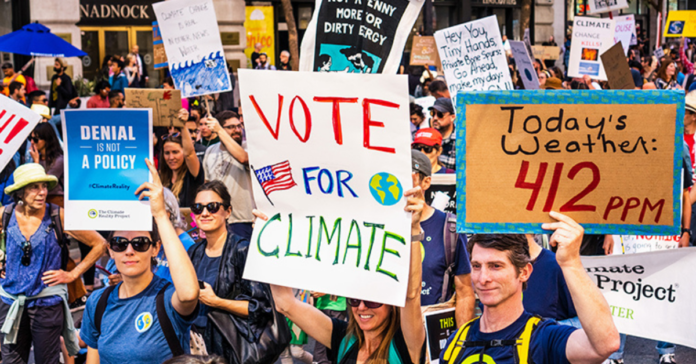Democrats and environmental champions tout climate and environmental issues as key battlegrounds in the 2020 race, but a forum held in DC this week found that while an important issue for some voters and candidates, not all are on board with radical climate activism, particularly voters in the west.
“We are seeing a rising concern about the problem of climate change,” said Cary Funk, director of science and society research at the Pew Research Center, speaking at an event Wednesday hosted by Politico and the Walton Family Foundation. “Of course it’s not across the board, it’s primarily in Democrats and not Republicans, but we do see that change and one thing that may be a contributing factor is more people seeing the local effects of climate change,” she added.
The risk is that 2020 could turn out to be like 2018—a much hyped green wave election that, in the end, didn’t happen, according to the panelists. In part, this may reflect the polarization of the debate. So far there has been very little bipartisan movement on climate change, even as an increasing number of freshman Republicans in Congress are advancing legislation to promote carbon capture, nuclear energy, and other transition technology, including Florida Rep. Matt Gaetz, Texas Rep. Dan Cranshaw, and others.
“One of the things that really saddens me about this issue is that it is a political issue when it should be a fundamental values issue,” said Sarah Hunt, co-founder and CEO of the Joseph Rainey Center for Public Policy at the event. For Hunt, environmentalism can work hand in hand with conservative values including personal responsibility and property rights.
This approach is too little, too late for the young climate activists behind the Green New Deal who demand immediate action and dismiss talk of innovation and bridge fuels as unrealistic at best and industry-promoted propaganda at worst.
“When I hear you talk about innovation and these solutions, I just scratch my head,” Evan Weber, youth activist and founder of the Sunrise Movement, told Hunt. “Nuclear power hasn’t gotten any better. It’s not marketable and not on line. It takes 10 years to build one reactor. How is that faster than putting cheap solar and wind installations up in six months.”
“It sounds a lot like crony capitalism,” he added.
Sunrise has endorsed a candidate in Colorado’s Senate race, Andrew Romanoff, that they feel hews closer to their vision than the apparent front runner, former Gov. John Hickenlooper, who they’ve deemed “dangerous” on climate issues, despite his run for the party’s presidential nomination before dropping out in August.
This sense of urgency is shared by some of the Democratic primary candidates, many of whom are releasing policy proposals inspired by Ocasio-Cortez’s Green New Deal, which call for dramatic transformations of the economy.
“We’ve tried [incremental change],” said Josh Orton, a senior advisor to presidential candidate and Vermont Sen. Bernie Sanders (D). “It would have been impressive 20 years ago, but now differences in solutions and timeline are differences in irreversible deadly climate change and not having that.”
Sanders is one among several Democratic hopefuls who have backed a ban on fracking that would have detrimental effects on western states, particularly on those like New Mexico, who’ve seen billions in additional revenues they’ve used to invest in education and infrastructure. However, his proposed policies have won the support of environmental groups, who see him as an ally. The day after the Politico event, the Sunrise Movement released a scorecard ranking Sen. Sanders’ climate platform the highest out of the top three Democratic primary candidates.
This fundamental policy divide likely explains part of the split in voter opinions. While increasing numbers of Americans believe that climate change is an area of concern, few people consider it a deciding issue in choosing a candidate.
Polling consistently shows climate change is a second-tier issue for voters. A poll released by the Center for Western Priorities in October found that, out of a list of issues, Colorado likely voters ranked environmental issues least important in determining their support for a candidate.
“This is a difficult issue because people want so much to just educate people into different issue positions,” Funk said. “Often times our attitudes are not hinging on information alone, they hinge on emotions and values.”
These divided opinions are particularly prevalent in western states, where energy and mineral development and outdoor recreation are both important industries. As 2020 approaches, voters from both parties agree that proper care of the environment is important. What this means from a policy perspective, though is an ever-more-contentious issue.

